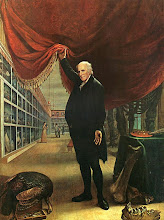Straining to keep the Rod Blagojevich story bubbling until such time as something else actually happens, and to imbue it with presidential significance (the only sort of significance the national political media seems to recognize), the New York Times yesterday resorted to a trope I call the "disappearing subject." This is where the media's desperate efforts to flog a story get elided by personifying (or in this case, animalizing) the story so that it can appear to be harassing the target all on its own: classically, questions the media obsessively raise are said to "dog" the candidate or official, as though the questions were formulating and asking themselves. This was the strategy the Times and many other outlets used to keep non-events like Whitewater and Travelgate going as scandals during the Clinton years.
Now here we are again, with Kate Zernike introducing her little piece on Illinois's history of corruption with a truly stellar bit of chin-stroking non-analysis of a vague, strictly perceptual event that has not yet occurred, even on that meta level:
In Illinois, a Virtual Expectation of Corruption - NYTimes.com
. . . Now the culture of his adopted home state threatens to dog President-elect Barack Obama, whose vacated seat in the Senate Mr. Blagojevich is accused of putting up for auction, much as swampy Arkansas politics dogged the last young Democratic politician elected on a platform of change, Bill Clinton.Prosecutors say Mr. Obama is not a subject of the investigation. And he has been a champion of ethics reform in the Illinois Legislature and in the Senate. But some Republicans have seized the opportunity to try to tie him to the worst side of Illinois politics.
Get that? The dogging, though only threatened, has been perpetrated not even by the story, but the thin pretext for writing it in a way that might touch president-elect Barack Obama ("the culture of his adopted home state"). I hate it when adopted home state cultures do that. Oh yes, and the very fact that the media used the same rhetorical tactics against Clinton becomes a way of linking Obama to the Clinton scandals, in the sense that NYT can bring up the two in the same sentence.
Who can take "ideas" like these seriously without being professionally invested in keeping American politics stupid?
[Also published at Publick Occurrences 2.0.]





No comments:
Post a Comment